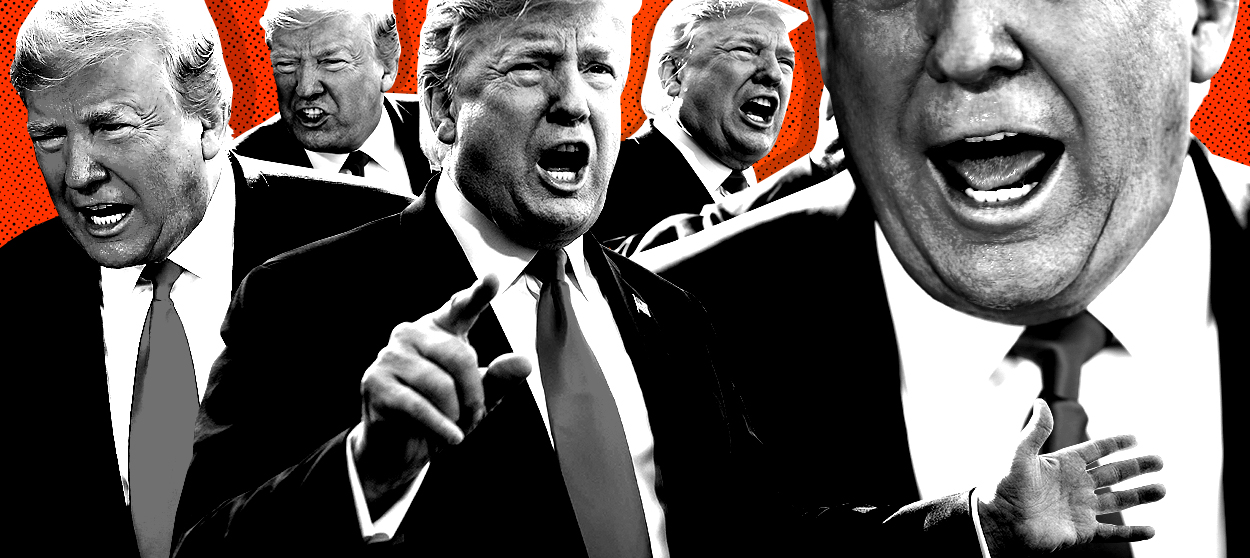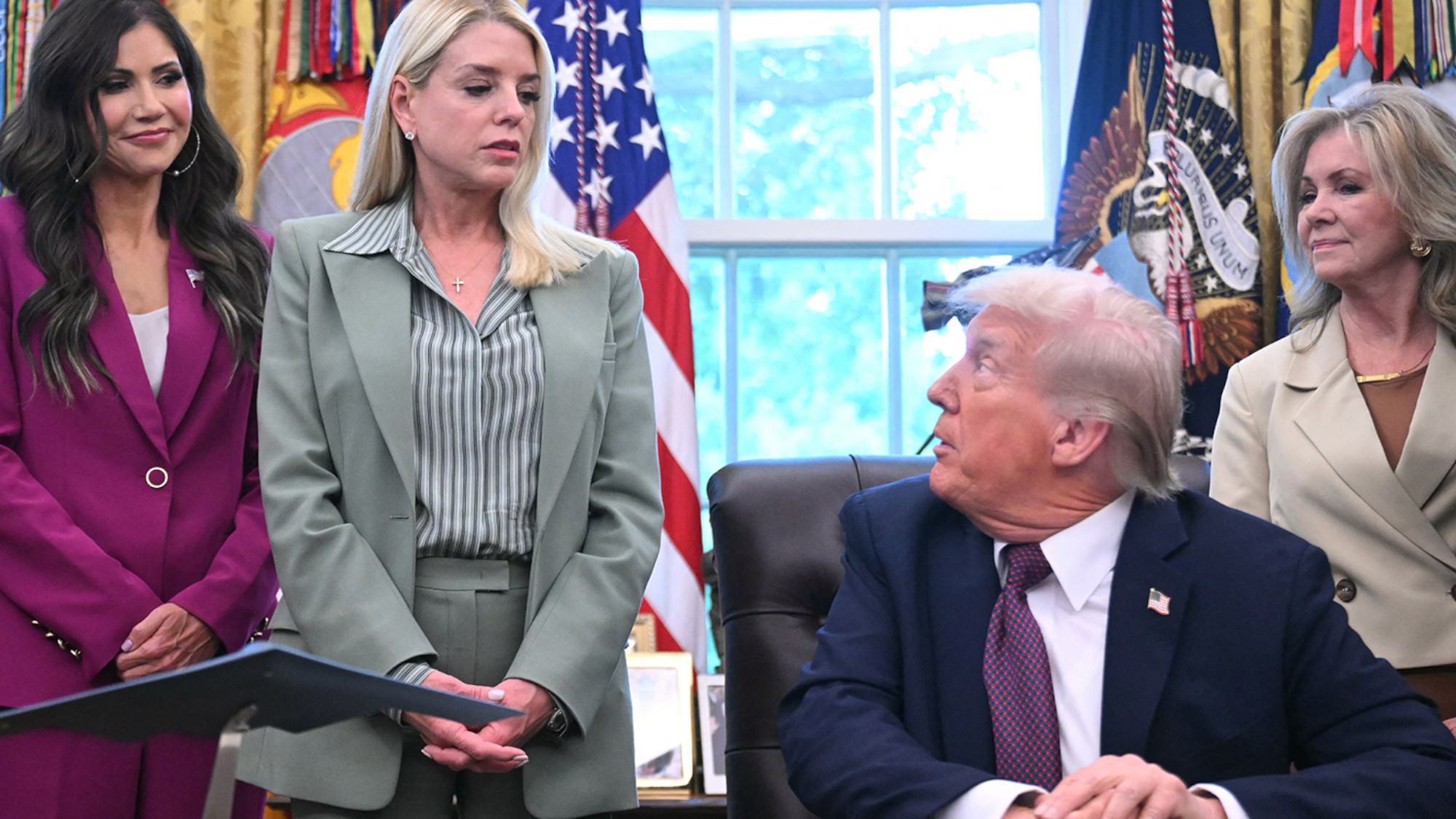Trump committed an impeachable offense just by threatening Adam Schiff
How Trump's opposition to the impeachment inquiry could itself be impeachable


A free daily email with the biggest news stories of the day – and the best features from TheWeek.com
You are now subscribed
Your newsletter sign-up was successful
President Trump indulged in a favorite daydream Sunday, ranting on Twitter about seeing his political enemies in jail.
Rep. Adam Schiff (D-Calif.) "made up what I actually said by lying to Congress," he charged, alleging Schiff spewed lies "made in perhaps the most blatant and sinister manner ever seen in the great Chamber. He wrote down and read terrible things, then said it was from the mouth of the President of the United States. I want Schiff questioned at the highest level for Fraud & Treason." Monday morning, the president redoubled this line of attack, suggesting Schiff be arrested because he "illegally made up a FAKE & terrible statement ... and read it aloud to Congress."
This is typical Trump, so understandably it garnered less attention than concurrent tweets musing about the launch of a second civil war, which the president apparently imagines will be waged on his behalf by a legion of furious evangelicals should he be removed from office. But Trump's particular citation of Schiff's remarks in Congress arguably puts this punitive fantasy in a separate category from his other prison-in-the-air reveries. It may itself be grounds for impeachment.
The Week
Escape your echo chamber. Get the facts behind the news, plus analysis from multiple perspectives.

Sign up for The Week's Free Newsletters
From our morning news briefing to a weekly Good News Newsletter, get the best of The Week delivered directly to your inbox.
From our morning news briefing to a weekly Good News Newsletter, get the best of The Week delivered directly to your inbox.
Now, the Constitution's list of impeachable offenses for the president is not terribly specific. The first two items of "treason, bribery, or other high crimes and misdemeanors" are plain enough, but the latter half adds enough vagary to permit considerable — and usually partisan — debate about what exactly should see our chief executive in the dock.
Records from the Constitutional Convention, however, show the "high crimes and misdemeanors" phrase was intended to encompass constitutional violations. George Mason was concerned treason and bribery alone wouldn't adequately check executive lawlessness because they failed to include "attempts to subvert the Constitution." He proposed adding this broader language to cover such scenarios, to ensure that the man "who can commit the most extensive injustice" would not find himself above the highest law of the land.
Unfortunately, this too fails to provide a straightforward path to impeachment consensus because we so often disagree on the Constitution's meaning. For example, I would argue the way Trump and other recent presidents have initiated military interventions without congressional permission is a dangerous violation of the constitutional assignment of war powers to the legislature — but it evidently strikes next to no one in Congress the same way.
Yet the way Trump ran afoul of the Constitution with his tweets about Schiff may be less subject to dispute. At issue is the Speech or Debate Clause, which says members of Congress "shall not be questioned in any other place" for "any speech or debate in either House."
A free daily email with the biggest news stories of the day – and the best features from TheWeek.com
The purpose of the clause is "principally to protect the independence and integrity of the legislative branch by protecting against executive or judicial intrusions into the protected legislative sphere," explains a Congressional Research Service report on the matter. The Supreme Court has ruled "the power to investigate ... plainly falls" in the realm of protected legislated acts, which means the fact that Schiff's offending remarks were made in the context of an official impeachment inquiry places them firmly under guard of this clause.
Thus Schiff can't be arrested and "questioned at the highest level for Fraud & Treason" because of what he "read ... aloud to Congress" because he can't be "questioned in any other place" for "any speech or debate in either House." Trump's tweet so precisely contradicts the Speech or Debate Clause it's almost as if he looked it up and demanded the opposite.
And that's how, as political scientist Jacob Levy has proposed, "Trump's tweet is by itself arguably impeachable." The Speech or Debate Clause is "not ambiguous as to its meaning, history, or intent," Levy contends, and Trump's contravention of it seems equally unambiguous.
Levy isn't the only one who thinks so. "A president of the United States accusing a member of Congress of treason is literally unconstitutional and presumptively impeachable," says his fellow political scientist, Paul Musgrave. "The [Speech and Debate] clause is specifically there to protect members of Congress from groundless prosecution by the executive for speech that the executive does not like," writes Dylan Matthews at Vox. "In other words, it exists for exactly this situation, to protect the Adam Schiffs of the world against the Donald Trumps of the world." (Legal experts have also raised the clause in connection to previous Trumpian efforts to impede congressional oversight.)
At this point there is no reason to think the House impeachment inquiry will shift or expand its focus to include this apparent constitutional violation, but it might not be a bad idea. Any check on presidential usurpation of legislative authority is welcome.
Or, to put it in Trump's own terms, we must protect our Constitution and enforce our laws against abuses of power in the executive branch.
Bonnie Kristian was a deputy editor and acting editor-in-chief of TheWeek.com. She is a columnist at Christianity Today and author of Untrustworthy: The Knowledge Crisis Breaking Our Brains, Polluting Our Politics, and Corrupting Christian Community (forthcoming 2022) and A Flexible Faith: Rethinking What It Means to Follow Jesus Today (2018). Her writing has also appeared at Time Magazine, CNN, USA Today, Newsweek, the Los Angeles Times, and The American Conservative, among other outlets.
-
 6 of the world’s most accessible destinations
6 of the world’s most accessible destinationsThe Week Recommends Experience all of Berlin, Singapore and Sydney
-
 How the FCC’s ‘equal time’ rule works
How the FCC’s ‘equal time’ rule worksIn the Spotlight The law is at the heart of the Colbert-CBS conflict
-
 What is the endgame in the DHS shutdown?
What is the endgame in the DHS shutdown?Today’s Big Question Democrats want to rein in ICE’s immigration crackdown
-
 The billionaires’ wealth tax: a catastrophe for California?
The billionaires’ wealth tax: a catastrophe for California?Talking Point Peter Thiel and Larry Page preparing to change state residency
-
 Bari Weiss’ ‘60 Minutes’ scandal is about more than one report
Bari Weiss’ ‘60 Minutes’ scandal is about more than one reportIN THE SPOTLIGHT By blocking an approved segment on a controversial prison holding US deportees in El Salvador, the editor-in-chief of CBS News has become the main story
-
 Has Zohran Mamdani shown the Democrats how to win again?
Has Zohran Mamdani shown the Democrats how to win again?Today’s Big Question New York City mayoral election touted as victory for left-wing populists but moderate centrist wins elsewhere present more complex path for Democratic Party
-
 Millions turn out for anti-Trump ‘No Kings’ rallies
Millions turn out for anti-Trump ‘No Kings’ ralliesSpeed Read An estimated 7 million people participated, 2 million more than at the first ‘No Kings’ protest in June
-
 Trump: Demanding the prosecution of his political foes
Trump: Demanding the prosecution of his political foesFeature Trump orders Pam Bondi to ‘act fast’ and prosecute James Comey, Letitia James, and Adam Schiff
-
 Ghislaine Maxwell: angling for a Trump pardon
Ghislaine Maxwell: angling for a Trump pardonTalking Point Convicted sex trafficker's testimony could shed new light on president's links to Jeffrey Epstein
-
 The last words and final moments of 40 presidents
The last words and final moments of 40 presidentsThe Explainer Some are eloquent quotes worthy of the holders of the highest office in the nation, and others... aren't
-
 The JFK files: the truth at last?
The JFK files: the truth at last?In The Spotlight More than 64,000 previously classified documents relating the 1963 assassination of John F. Kennedy have been released by the Trump administration
